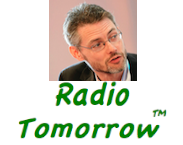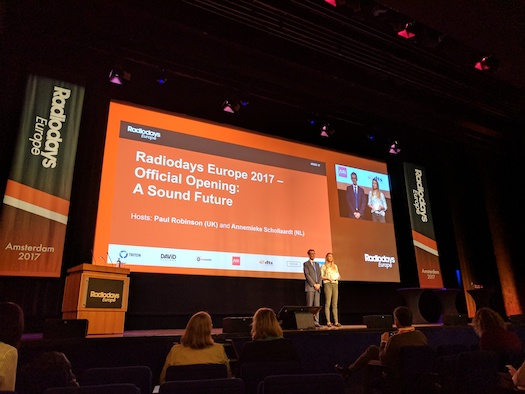Radio Tomorrow with James Cridland
I write this having attended Radiodays Europe for the past few days. It’s a big radio conference – the biggest in the world, in fact, with 1,500 people going there.
The conference rotates country in Europe: this year it was in Amsterdam in The Netherlands, next year it’ll be in Vienna, Austria. Four tracks of well-produced content always leads to some interesting thoughts, and a difficult experience of knowing which to go and see.
Of course, attendance is, in the most part, European. This year I bumped into a surprising amount of Australians and Americans who were there to learn from the European radio industry.
In many cases, there’s lots to learn. The UK commercial radio industry has just celebrated record revenue, as has the Finnish. The industry seems positive throughout: buoyed up by collaborative working and a shared sense of purpose. The overwhelming feel from the conference this year was one of “one radio” – success stories where the radio industry is working together.
One such story was from Norway, where they’ve begun the process of switching off FM for the majority of stations. I hosted the panel for this, and heard a presentation (co-presented by Norwegian commercial and public radio) explaining why and how they turned off FM, and – for the first time – what the effect has been.
It turns out that total radio listening in the areas where FM is now turned-off has gone down: hardly surprisingly. However, it’s down by only 10 percentage points: lower than they feared. Interestingly, use of music streaming hasn’t increased, and nor has listening using the internet. They lay the reason for the lower figures partly at the door of car manufacturers, who’ve been a little slow in incorporating DAB+ into new cars.
Another great session was one on innovation, by SImon Gooch of Swedish Radio. He said that he’s trying to make innovation a function of all departments, rather than trying to set up a separate innovation team.
And, yes, we heard lots about podcasting – Manoush Zomorodi from WNYC with a typically polished presentation arguing for broadcasters to “speak normally” and to incorporate listener feedback in their programming.
You’re probably thinking “that’s nice, James, but I’ve heard of all of these things before”. And, to an extent, you’d be right. The web, and particularly my weekly newsletter, has succeeded in sharing these ideas and information. I know of a few companies who are proud that they don’t send people to conferences any more.
However, visiting a conference like this not only reaffirms things we knew – which is useful to many of us; it also allows us to talk with others; to get radio’s story straight, to check that others feel the way we do about radio. An international conference, as Radiodays Europe is, also allows us to steal ideas from other countries and claim them as their own.
It’s easy to think that, with the internet, we have access to all the inspiration we need. But inspiration doesn’t come from blog posts or articles. It comes from people. Which is why, perhaps just once or twice a year, a radio conference is a good thing to experience.
About The Author
 James Cridland is a radio futurologist: a writer, speaker and consultant on the effect that new platforms and technology are having on the radio business across the world.
James Cridland is a radio futurologist: a writer, speaker and consultant on the effect that new platforms and technology are having on the radio business across the world.
He writes for publications across the world, and runs media.info the worldwide media information website. He also runs a free weekly newsletter with news of radio’s future.
British by birth, James lives in Brisbane, QLD and is a fan of craft beer.
See our coverage of Radio Days Europe 2017 here.

